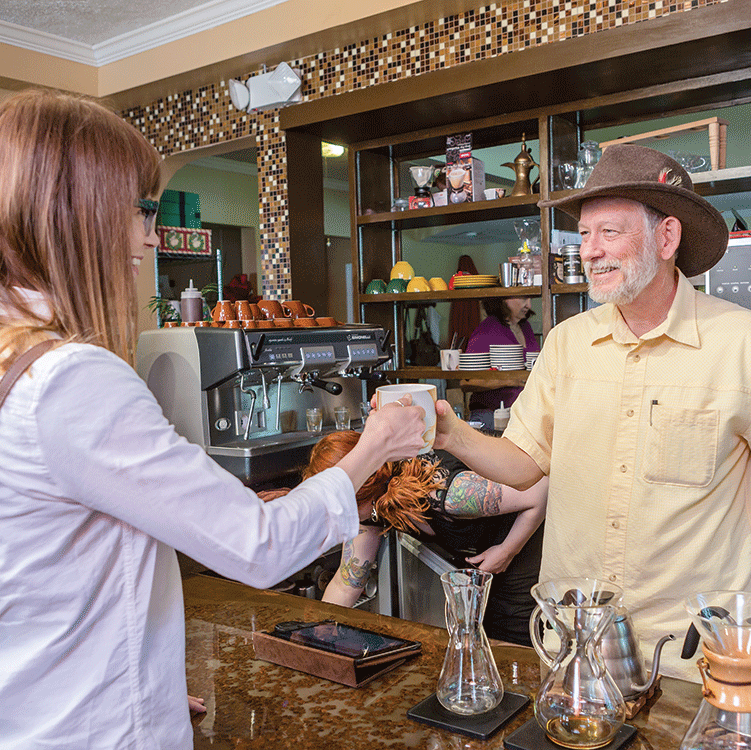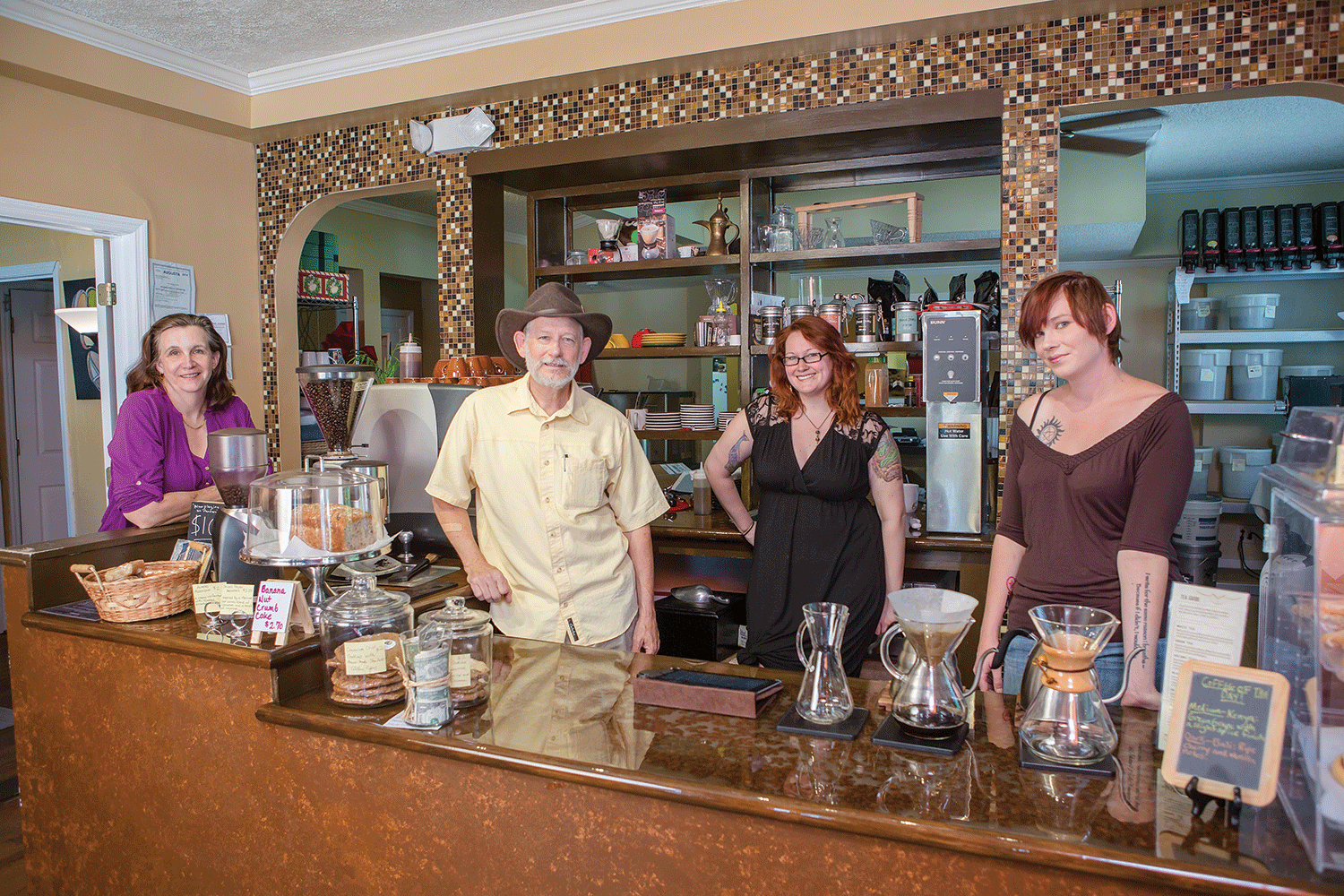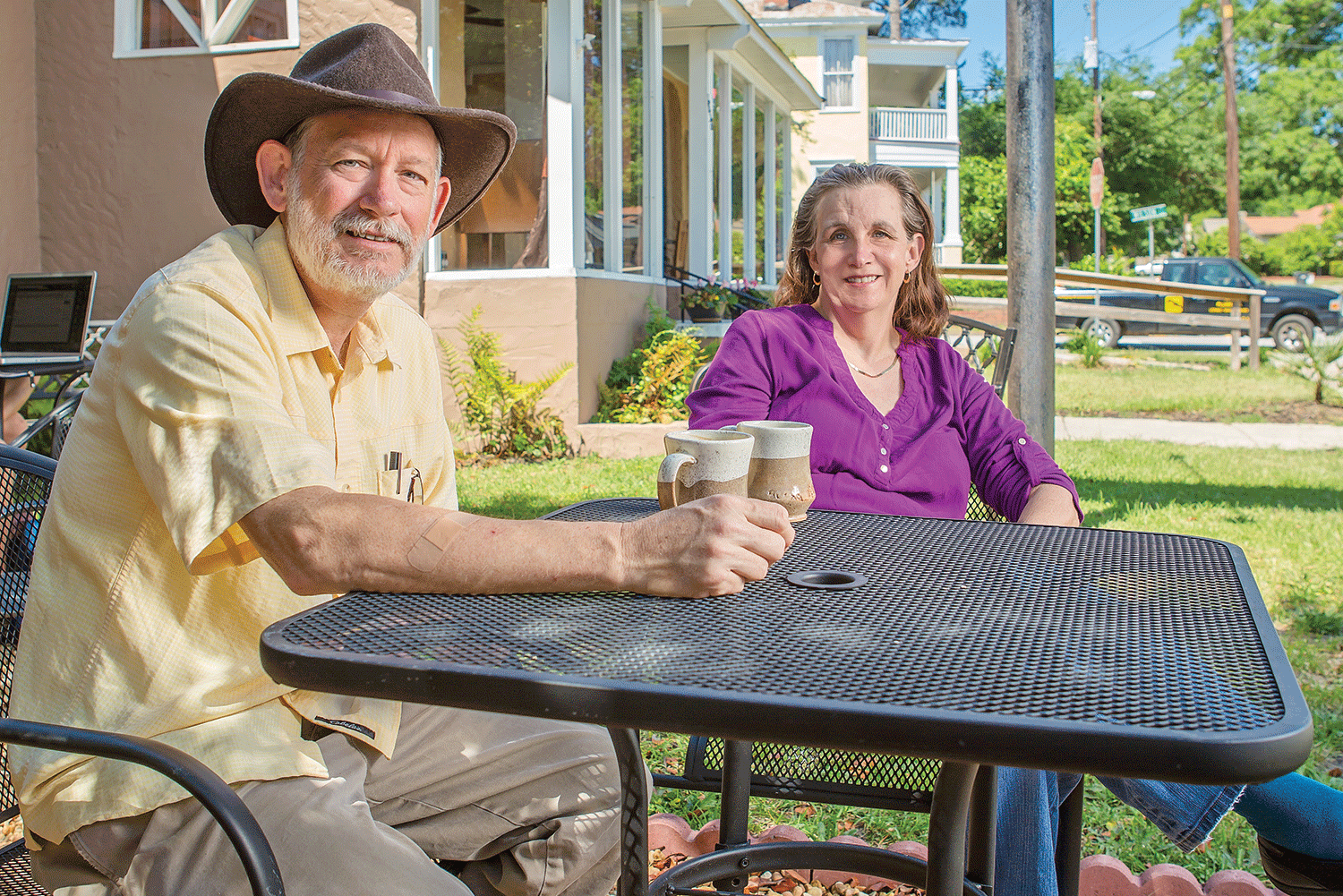THERE’S NEVER a good time to be diagnosed with cancer, and John Curry’s diagnosis is a testament to that. In February 2013, one week before his health insurance ran out—and a week after he closed on a loan to launch a new coffee shop business with his wife, Pat—the photographer-turned-coffee-roaster was diagnosed with colorectal cancer following a routine colonoscopy.
After several years of roasting coffee, first as a hobby and then as an online enterprise, the couple, both 53, had recently signed a lease for the location of their dream business, the Buona Caffe Coffee & Espresso Bar in Augusta, Ga. Then came John’s diagnosis. “All of a sudden, everything blew up,” says Pat.
Even though it seemed like a terrible time to open a business, Pat recalls, the couple never really had a conversation about not going forward. They had finally stepped toward their dream and had no intention of turning back.
“After the surgery, going through the four months of chemo after that—that was just awful,” says John, whose colorectal cancer was diagnosed as stage III. “Working helped me keep my mind off it as much as possible.”

While getting their new coffee business off the ground, John and Pat Curry took John’s cancer treatment one step at a time. Photo by Steve Bracci
Unexpected Jolts
John and Pat Curry never intended to get into the coffee business. They were journalists first, and until a few years ago, they thought they would remain so until they retired.
The couple, who have been married for 33 years, met as seniors in high school in Fort Myers, Fla., and began dating in the 1970s, when they both worked at the News-Press, based in Fort Myers. John was a staff photographer and Pat was a clerk. Eventually, Pat left to become a freelance journalist and editor while John continued in the newspaper world. They moved to Augusta in 2009 when he accepted a job as the visuals editor at the Augusta Chronicle.
Roasting coffee was simply a hobby—a project they started at home with a tiny roaster. “I was spending Saturday afternoon on the porch roasting enough coffee for us for the week,” says John. “It was much better than the coffee you could buy at the store.”
The Currys’ friends who tasted it agreed—and they asked to buy some. To meet the demand, the couple purchased a bigger roaster, and then an even bigger one. By 2010, they had set up an online shop, Buona Caffe Artisan Roasted Coffee, to sell their beans. The name was inspired by their 25th wedding anniversary trip to Italy, where “Buon Caffe” means “good coffee.” (The Currys found out later that they had misspelled part of the name.)
Soon, the couple began talking about turning their side business into a full-time career—including a cafe—when they retired. That moment came much earlier than expected when John was laid off in August 2011.
“With the way the newspaper business has been going, my possibilities weren’t great” after the layoff, he says, pointing to widespread job losses in journalism. He decided to use the layoff as a launching pad for a new career direction, and in November 2012, the Currys signed the lease for a storefront on Central Avenue in Augusta—an area known as the Hill since it’s uphill from the main downtown area—and then applied for a U.S. Small Business Administration–guaranteed loan to renovate the space into the Buona Caffe Coffee & Espresso Bar. “I’ve pretty much gone feetfirst into the coffee roasting and shop ownership,” says John.
The couple’s COBRA health insurance was scheduled to run out in February 2013, and John’s doctor urged him to have a routine colonoscopy because he had not yet had his first colorectal cancer screening, which is recommended at age 50 for men and women of average risk. (The doctor encouraged Pat to get a routine mammogram.) During the colonoscopy that February, John’s doctors found a tumor, and he was subsequently diagnosed with colorectal cancer. It was a week after the couple had closed on their loan.
The Currys were already well into renovations of the cafe space that they had begun before the loan came through. And John had already taken two courses on running a small business through the Georgia Small Business Development Center. So despite John’s diagnosis, they pushed ahead with their dream.
“What else were we going to do?” says John.
The Currys offer their tips for making it work.
Cancer survivors Pat and John Curry offer advice gleaned from their personal experience of running a coffee business while dealing with John’s cancer treatment.
Consider being open about the diagnosis.
Initially, the Currys weren’t forthcoming with their business contacts about John’s cancer diagnosis—a decision they regret. When they finally shared the news, their colleagues were understanding and even stepped up to pitch in.
Hire help if possible.
John wasn’t able to lift anything heavy after his surgery, so he and his wife hired an assistant roaster three months earlier than they had planned to do. The assistant is now a crucial part of the company, and his contribution has allowed John to focus on growing the business.
If you enjoy your work, it can be a welcome distraction.
The company’s success buoyed the Currys’ spirit during the worst of John’s treatment. “We were really glad that we had the shop to focus on and keep us occupied,” says Pat.
Blending Work and Treatment
Pat scrambled to find health insurance for the couple in a state-sponsored program that accepted individuals with pre-exisiting conditions like John’s cancer. Then she negotiated with the company that made John’s chemotherapy drugs to provide them for free because the insurance didn’t cover the medications. In March 2013, John started preoperative chemotherapy by taking Xeloda (capecitabine) orally, along with undergoing radiation. That was followed in June by surgery to remove his tumor and 18 inches of colon and upper rectum. The surgeon also gave him a temporary ileostomy—an opening in the abdomen for digestive waste to exit the body into a pouch. From July through November, he continued with intravenous Eloxatin (oxaliplatin) with Fusilev (levoleucovorin) every two weeks plus an infusion pump of fluorouracil (5-FU) for 40 hours at home, followed by another operation in December to reverse the ileostomy.
Despite all of the challenges of John’s diagnosis and treatment, starting the cafe business became a mental boost and welcome distraction for the couple.
Being occupied gave John something to focus on instead of the cancer or his symptoms and treatment side effects, which included weight loss, fatigue, nausea, diarrhea, dehydration and sensitivity to anything cold. Except while recovering from surgery, he continued to work, mostly by overseeing the roasting of the coffee. “I felt bad a lot, but I still kept going into work every day as much as I could.”
He and his wife had to make adjustments. Some were small, like putting a cot in the roasting room so John could rest when he got tired. Others were big, like hiring their first full-time employee—an assistant roaster—three months early.
Pat was concerned that some job candidates would not be comfortable working with a cancer patient—in 1990, she herself had been diagnosed with malignant fibrous histiocytoma, a form of sarcoma, in her right forearm. (Today, she is healthy.) In the end, the Currys hired a 26-year-old cancer survivor for the position.
More help came when one of their two daughters, Elisabeth, 27, who had experience working in coffee shops while living in Virginia, moved in with her parents. She ran the shop while John recovered from his surgeries and Pat cared for him, and Elisabeth eventually became one of the couple’s four current employees.
Other assistance arrived only after the couple learned a valuable lesson. They had made a mistake, Pat says, by not letting people in their community know about John’s diagnosis. “You’ve got to have a support system in place, and we cut ourselves off from our support system by not telling them,” she says. They changed their stance after they missed an order of the free coffee they provide for intermissions at the Symphony Orchestra Augusta.
“That’s when we both looked at each other and realized this wasn’t working,” she says. “We can’t go through this and not let people know what’s going on. It’s too much for us to do by ourselves.” Along with offering a profuse apology, the Currys told their contact at the symphony about John’s cancer. And, says John: “She didn’t care [about the missed order]. She was more concerned with us.”
The Currys also reached out to Susan Caldwell, the area director of the Georgia Small Business Development Center in Augusta, for guidance on how to adjust their business plan with John’s needs in mind. Staffing the shop sooner than expected became a priority, for example, and Caldwell helped them figure out the financial and practical aspects of doing so.
Caldwell says she is not surprised that the couple forged ahead with the cafe and were successful. “I think some people would have thrown in the towel, gone to their landlord, and said they were putting the project on hold,” she says. “I think that speaks to their passion and their determination that they were going to keep moving forward. They now had some hurdles that they hadn’t anticipated, but they were going to do it.”
Learn the basics of when and how to be screened.
Most men and women should begin colorectal cancer screening at age 50. People with factors that increase their risk of the disease, including certain inherited conditions or family histories, may need screening earlier and more frequently; they should discuss their options with their doctor.
For individuals without specific increased risk factors, the U.S. Preventive Services Task Force (USPSTF) recommends the following.
Ages 50 to 75: Get routine screening with fecal occult blood testing (FOBT) every year; sigmoidoscopy every five years (along with FOBT every three years); or colonoscopy every 10 years.
Ages 76 to 85: Routine screening is not recommended. Discuss with your doctor whether colorectal cancer screening is appropriate for you.
Ages 85 and above: No screening is recommended. There is moderate or high certainty that colorectal cancer screening at this age has no overall benefit or that the potential harms of screening outweigh the benefits.
Source: USPSTF
What are colonoscopy, sigmoidoscopy and FOBT?
Colonoscopy: A doctor uses a colonoscope (a thin, flexible tube with a small video camera) to look for (and possibly remove or biopsy) polyps or other abnormalities on the inside of the entire colon and the rectum.
Sigmoidoscopy: A doctor uses a sigmoidoscope (a shorter version of a colonoscope) to look for (and possibly remove or biopsy) polyps or other abnormalities inside the lower part of the colon and the rectum. A colonoscopy may be needed if the doctor finds anything unusual.
High-sensitivity FOBT: Patients use a kit at home to collect stool samples that are then tested for blood, which may indicate the presence of cancer or polyps. There are two types of FOBT: One uses a chemical to detect blood. The other, a fecal immunochemical test, uses antibodies to detect blood. A colonoscopy will likely be needed if the test finds any blood.
Source: American Cancer Society
Savoring Success
Pat Curry says she couldn’t have asked for a better outcome for the business so far. Personally, it’s a perfect fit, she says. John can roast and share his coffee, and she can be where she’s most comfortable: around a lot of people.
“This is a fun business for us,” she says. “I am happiest whenever I have a house full of people who are enjoying themselves. With the coffeehouse, we have a house full of people enjoying themselves every single day.”
Since its founding, Buona Caffe Artisan Roasted Coffee has been named Best Coffee in Augusta twice in Augusta Magazine’s annual readers’ poll. In December 2012, the software company Intuit picked the Currys’ business from among more than 5,000 entries as the first recipient of its “Small Business, Big Wishes” program. (The couple used the $4,200 prize money to buy an espresso machine.) In 2013, the cafe was named one of the top 15 independent coffee shops in America by Fodor’s Travel, and John won the 2013 alumni award from the StartSmart program at the Small Business Development Center in Augusta. Today the couple’s coffee is even served at the Georgia Governor’s Mansion.

Pat and John Curry, pictured with daughters Katie, in back, and Elisabeth, at right, have grown Buona Caffe Coffee & Espresso Bar into a popular Augusta, Ga., coffee shop. Photo by Steve Bracci
Like the business, John has been growing stronger, too. Five-year survival for a case like John’s is more than 70 percent, and since December, after the surgery to reverse his ileostomy, John has regained almost all of the 30 pounds he lost during treatment. Follow-ups with his health care team have gone well, too: He continues to see his oncologist for blood work and his surgeon to check on the progress of his recovery. He has no signs of cancer and will continue to have colonoscopies every year.
Meanwhile, John and Pat feel closer than ever to their supportive neighbors and colleagues. The couple closed on a new home on Valentine’s Day, cementing their lives as key contributors to the Augusta community, one cup of coffee at a time.
Cancer Today magazine is free to cancer patients, survivors and caregivers who live in the U.S. Subscribe here to receive four issues per year.





